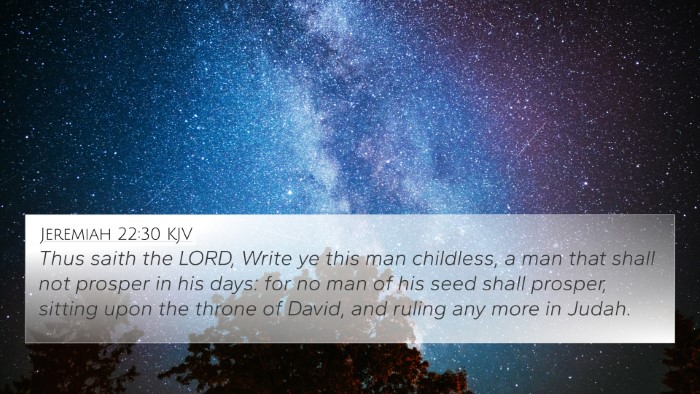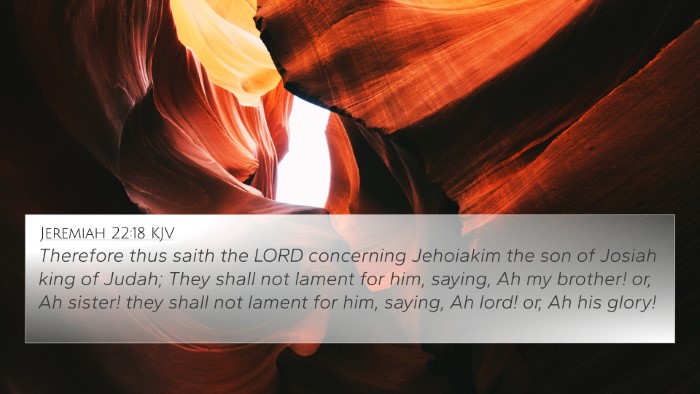Understanding Jeremiah 36:30
Jeremiah 36:30 is a significant verse in the context of the message delivered through the prophet Jeremiah and the consequences faced by King Jehoiakim of Judah. This verse serves as a warning and illustrates the fulfillment of God’s judgment against those who oppose His word.
Verse Explanation
Jeremiah 36:30 reads: “Therefore thus says the Lord concerning Jehoiakim king of Judah: He shall have no one to sit on the throne of David, and his dead body shall be cast out to the heat of the day and the frost of the night.” In this verse, God delivers a harsh decree against Jehoiakim, reflecting both the gravity of his actions and the unwavering nature of God's covenant promises.
Context and Background
This verse comes in the context of a narrative where Jeremiah, instructed by God, had been warning Judah of impending doom due to their unfaithfulness. Jehoiakim represents the kings who turned away from God, favoring their own interests, and in doing so, he disregarded the warnings delivered through Jeremiah.
Commentary Insights
-
Matthew Henry:
Henry emphasizes that Jehoiakim's actions directly led to his disgrace. His refusal to heed God's word results in a severe judgment, indicating that God will not allow His throne and promises to be undermined by ungodly leadership.
-
Albert Barnes:
Barnes notes the conditional nature of God's promises, suggesting that if the leaders of His people contradict His commands, they risk losing their position and blessing. Jehoiakim’s fate acts as a cautionary tale reflecting God's justice.
-
Adam Clarke:
Clarke points out that the metaphor of being cast out symbolizes utter rejection and dishonor. Not only does this show the literal consequence for Jehoiakim but also serves as a prophetic sign of the spiritual state of Judah at that time.
Bible Verse Cross-References
Understanding Jeremiah 36:30 can be enhanced by looking at various Bible verse cross-references. Here are some key verses that relate to the themes of judgment, leadership, and God’s sovereignty:
- Jeremiah 22:30: “Write this man down as childless, a man who shall not succeed in his days…” - A direct reference regarding Jehoiakim’s legacy.
- 2 Kings 24:6: "So Jehoiakim slept with his fathers; then Jehoiachin his son became king in his place." - Demonstrates the succession bound by God’s judgment.
- Isaiah 14:19-20: Similar themes of dishonor for ungodly kings and their ultimate downfall.
- Jeremiah 20:5: “I will give all the wealth of this city… to the hand of their enemies.” - A broader statement of God’s judgment over Jerusalem.
- Lamentations 5:12: “Princes are hanged up by their hand: the faces of elders were not honored.” - Showing the humiliation of leadership in rebellion against God.
- 1 Chronicles 10:14: “But he sought not the Lord…” - Echoing the necessity of seeking God for a faithful reign.
- Luke 1:33: “And he will reign over the house of Jacob forever…” - A contrast to the failed kingship of Jehoiakim in light of God’s eternal kingdom.
Thematic Bible Verse Connections
The themes present in Jeremiah 36:30 can be interconnected with various motifs throughout Scripture:
-
Judgment on Leaders:
Cross-references such as Ezekiel 17:16 and Proverbs 29:12 reflect God's consistent principle regarding the accountability of leadership, showing that leaders bear the weight of their influence.
-
The Sovereignty of God:
God's control over history and nations is seen in Daniel 2:21, revealing His authority over throne and kingdom, emphasizing that He can raise and depose rulers.
-
Wisdom in Leadership:
Various passages talk about the importance of godly wisdom in leadership (e.g., James 1:5) versus the folly displayed by Jehoiakim.
Inter-Biblical Dialogue
By examining the narrative surrounding Jeremiah 36:30 and related scriptures, one can engage in an inter-Biblical dialogue expressing the continuity of God’s message concerning His covenant, judgment, and the nature of true leadership.
How to Use Bible Cross-References
For those looking to delve deeper into the connections between Bible verses, consider using tools such as a Bible concordance or a Bible cross-reference guide. Here are some methods to enhance your study:
- Identify pivotal words and themes in your verse.
- Utilize a bible cross-reference system to find related verses.
- Engage in cross-referencing Bible study methods to explore themes across Testaments.
- Make use of bible reference resources to develop a comprehensive understanding.
Conclusion
Jeremiah 36:30 highlights the serious consequences of turning away from God and is interwoven with the broader biblical narrative of judgment, leadership, and the sovereignty of God. Understanding such verses through cross-referencing opens pathways to deeper insights into biblical teachings and enhances our theological reflections.






